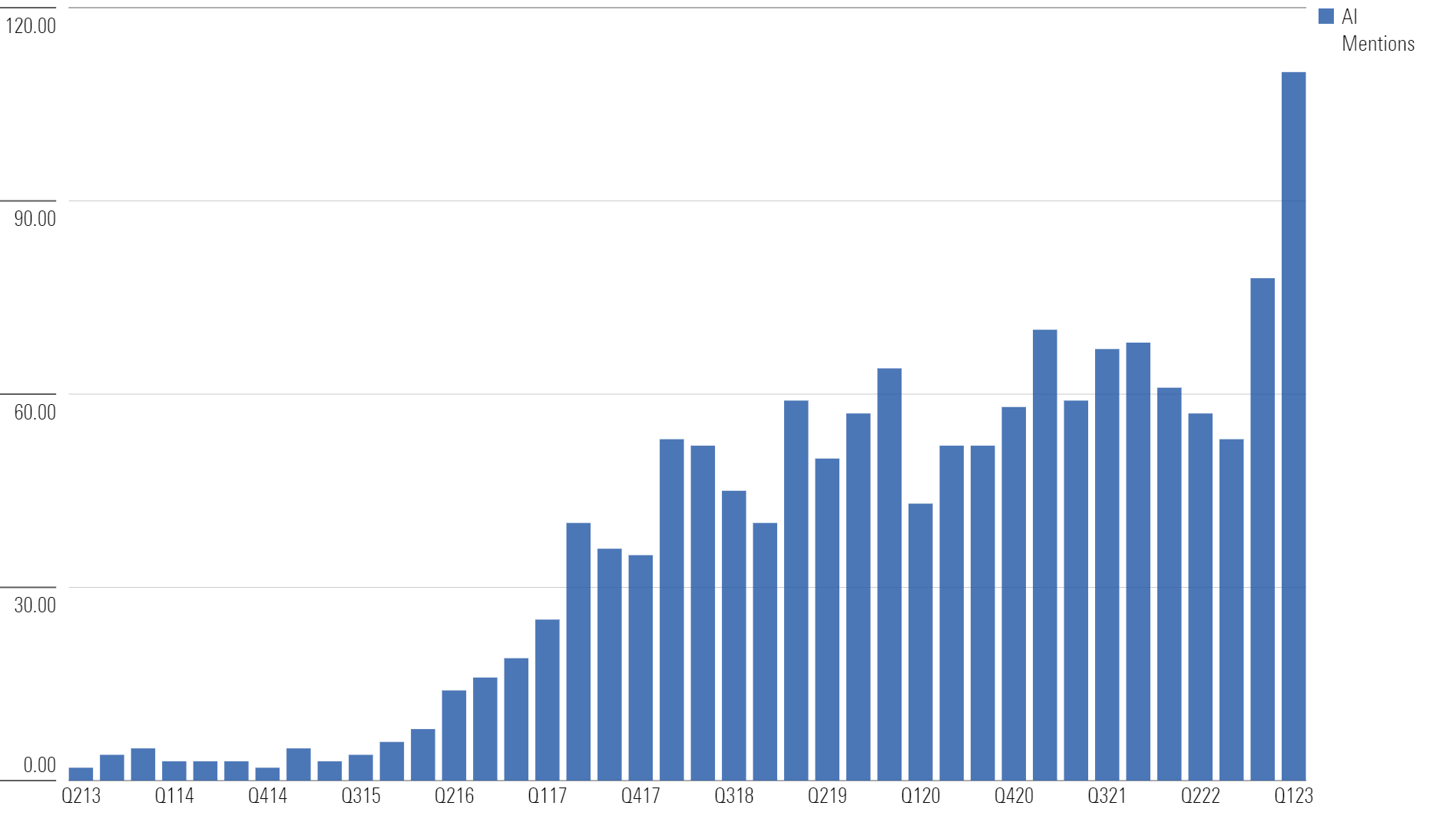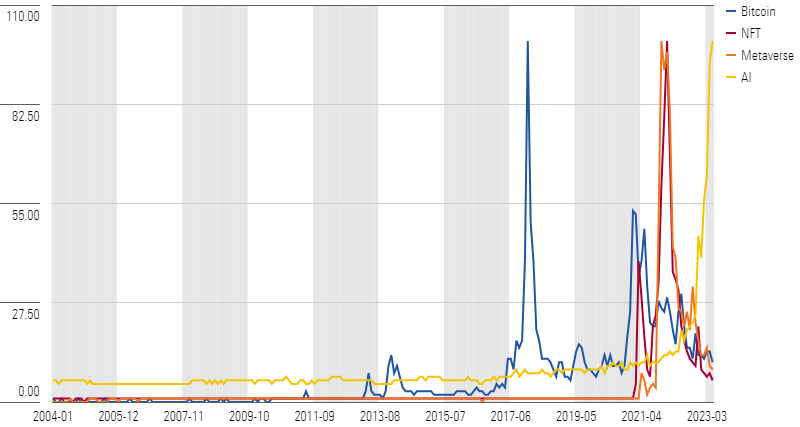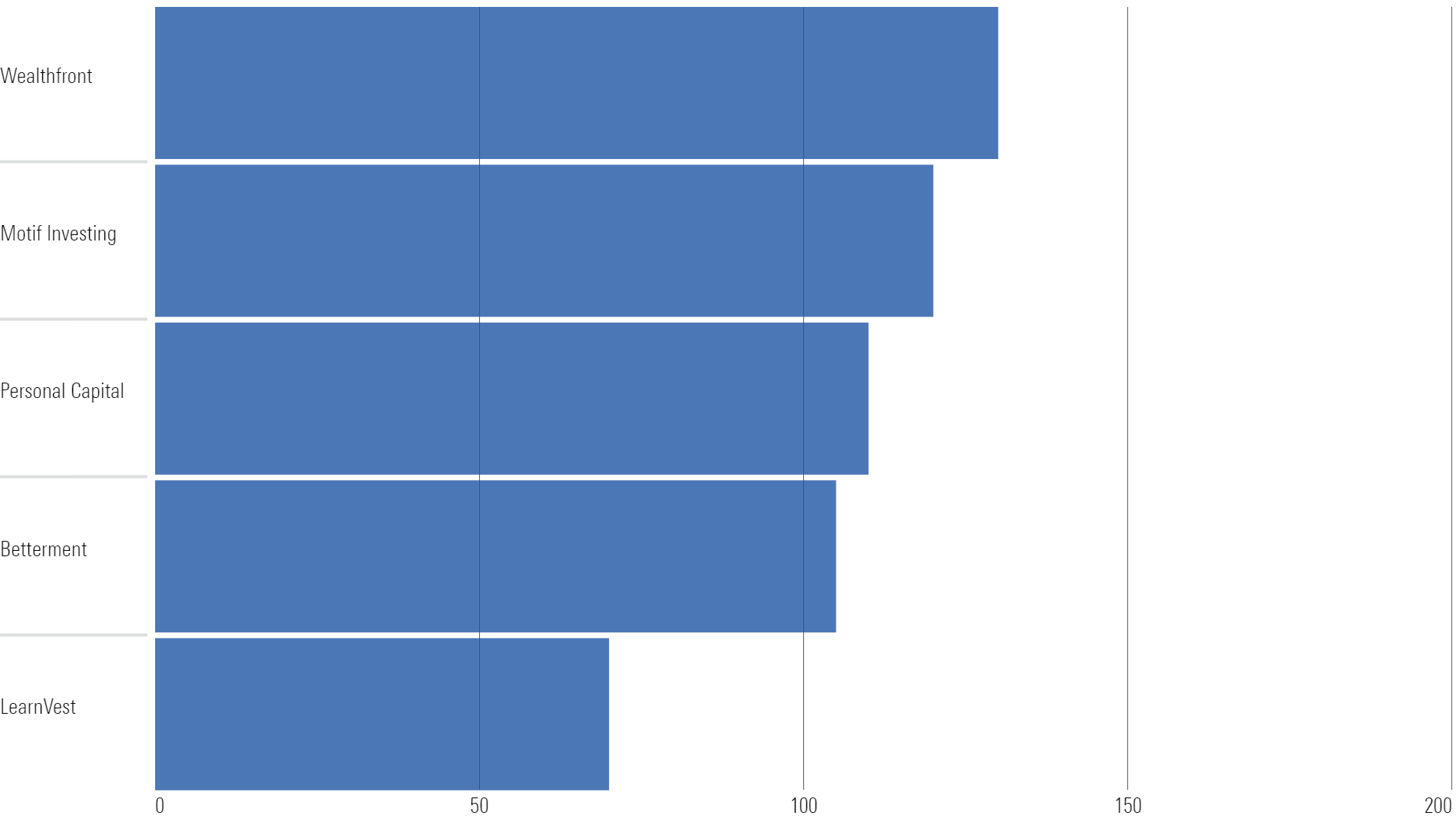Artificial Intelligence Won’t Replace Financial Advisors
AI seems more likely to offer advisors ways to enhance their practice, rather than interrupt it.

John Zimmer—the founder of Lyft—claimed in 2016 that the majority of rides on Lyft’s platform would come from autonomous vehicles by 2021.
Fast-forward half a decade, and only a fraction of Lyft’s rides come from autonomous vehicles.
The future doesn’t always unfold the way we plan. This is a feature of new technology—we often overestimate its short-term impact.
The new technology nobody can stop talking about is artificial intelligence. There is a sense that AI will have an immediate and outsize impact on society, which is both exciting and potentially daunting. The number of U.S. large-cap companies mentioning AI on quarterly conference calls doubled over the past year.
Number of U.S. Large Companies Mentioning AI on Earnings Call

Bill Gates recently described the importance of AI as follows:
“The development of AI is as fundamental as the creation of the microprocessor, the personal computer, the internet, and the mobile phone. It will change the way people work, learn, travel, get healthcare, and communicate with each other. Entire industries will reorient around it. Businesses will distinguish themselves by how well they use it.”
Nearly everyone is trying to decipher AI and determine its impact on them.
What Is AI?
First, a short description of what AI is: The application of mathematics and software code to teach computers how to understand, synthesize, and generate knowledge.
In short, it’s the attempt to merge person and machine.
AI is a computer program—it runs, takes input, processes, and generates output. AI’s output is useful across a wide range of fields—from coding to general insights on random topics.
As a brief background, AI is somewhat of a nebulous concept. The technology everyone seems to be focused on is ChatGPT and the product it offers, a language learning model, which can provide detailed responses to a litany of questions.
But zooming out, AI is owned by people and controlled by people, like any other technology.
The AI Hype Cycle
By one metric—Google Trends—the ascent of AI is following the same trajectory as other recent hype cycles in bitcoin; nonfungible tokens, or NFTs; and the metaverse.
Google Trends by Word

This is a tale as old as time. People often cannot help themselves when it comes to new and exciting technologies. History is full of these stories:
- The creation of fiat currencies led to the South Sea Bubble in the 1700s.
- The invention of trains led to a railroad mania in the 1800s.
- The Roaring ‘20s—defined by the creation of automobiles, radios, and films—were followed by the Great Depression.
- The dot-com bubble in the late ‘90s followed the inception of the internet.
Each of these periods ended up changing the world. But the speculation that occurred in the early stages of them led to huge booms and painful busts.
Speculation in AI Is Certainly Taking Place
Nvidia NVDA—a technology company that sells processors that run AI services—added nearly $300 billion in market capitalization after its most recent earnings report.
For perspective, $300 billion in market capitalization is larger than all but 20 companies in the United States. And it was added in a single day.
New York University finance professor Aswath Damodaran recently mentioned that “you’re pushing the absolute limit of what sustainable value is,” in reference to Nvidia’s meteoric stock rise.
Morningstar’s own equity research has found that AI will be a game changer for Nvidia, but the company likely trades above its fair value in terms of the current stock price.
AI and Financial Advice
There have been many threats, or perceived threats, to the financial advice model in recent years.
Robo-advisors were the most recent David that was coming for Goliath.
It was a common argument that advisors would be disrupted by robo-advice. In fact, large sums of investor money were betting on it. Many of the largest robo-advisors raised hundreds of millions of dollars.
Robo-Advisors' Total Funding

But the advisor disruption that many predicted did not unfold. Except for Betterment, every company listed above was acquired by a bank, brokerage, or large asset manager.
Instead of slaying Goliath, it seems more like David went and worked for Goliath.
Many financial advisors used the robo-technology to become more efficient, primarily using it to service smaller clients, freeing up time for larger relationships. The robo-technology was also great at automating tasks like tax-loss harvesting, rebalancing portfolios, and reinvesting dividends.
It’s probably a good bet that AI could be a similar unlock for advisors. Instead of disruption, there’s probably a future where AI makes advisors more efficient.
The Trust Hurdle
Around the same time Lyft’s LYFT founder claimed a self-driving future was imminent, an early Uber UBER investor and prominent venture capitalist—Bill Gurley—held the opposite view:
“The part [autonomous driving] hasn’t figured out yet is the last 3%, which is snow, rain, all the really, really hard driving conditions. They have done all the easy stuff.”
Gurley’s simple point was that even if autonomous driving can chauffeur people around safely 97% of the time, the other 3% may take another few decades to master, if ever.
Perfecting autonomous driving technology is only one of the hurdles that must be cleared. Another hurdle—and arguably the most important—is trust.
Despite the rise of self-driving cars, many surveys indicate most people are hesitant to ride in them for safety reasons. Autonomous vehicles still must prove that they are significantly safer than human-driven cars (across a range of driving conditions) to achieve mass adoption.
A similar trust hurdle applies to AI and financial advice. There are situations where AI can deliver quick and easy financial advice. If you ask AI, “What’s the lowest-cost way to get exposure to the U.S. stock market?”—it will provide a great answer.
But there reaches a point of complexity where AI hits a wall. There were many articles during the rise of robo-advisors that declared that robots were going to put financial advisors out of business.
Obviously, that has not happened.
A key lesson from the rise of robo-advisors was finding out that a portfolio is not the same thing as a financial plan. A strong financial plan goes beyond asset allocation. Advisors well versed in financial planning, estate planning, tax planning, and insurance can easily differentiate themselves.
And because offering all aspects of financial advice, like driving in difficult conditions, often involves high risk and complexity, trying to replace human advisors with AI seems like a nonstarter.
AI and the Future of Financial Advice
AI will change the game, but it is unlikely to replace financial advisors. Rather, it will likely be an enabler, helping advisors increase productivity and deliver better advice for complex client scenarios.
For advisors who leverage social media for business development, AI can make posting on LinkedIn more efficient. For instance, if an advisor writes a blog on estate planning and wants a one-sentence executive summary plus brief bullet points, this is where AI excels. Advisors could simply paste a link to their article in the AI prompt, provide instructions and a request for a few versions of the summary, pick their favorite, and post to LinkedIn. A job that previously took a half-hour or longer might now take five minutes.
While the future is never certain, AI seems more likely to offer advisors ways to enhance their practice, rather than interrupt it. The most useful form of intelligence for sound financial advice will always come from humans.
After all, that’s who designed the AI technology.
Morningstar Investment Management LLC is a Registered Investment Advisor and subsidiary of Morningstar, Inc. The Morningstar name and logo are registered marks of Morningstar, Inc. Opinions expressed are as of the date indicated; such opinions are subject to change without notice. Morningstar Investment Management and its affiliates shall not be responsible for any trading decisions, damages, or other losses resulting from, or related to, the information, data, analyses or opinions or their use. This commentary is for informational purposes only. The information data, analyses, and opinions presented herein do not constitute investment advice, are provided solely for informational purposes and therefore are not an offer to buy or sell a security. Before making any investment decision, please consider consulting a financial or tax professional regarding your unique situation.
Morningstar Investment Management LLC is a Registered Investment Advisor and subsidiary of Morningstar, Inc. The Morningstar name and logo are registered marks of Morningstar, Inc. Opinions expressed are as of the date indicated; such opinions are subject to change without notice. Morningstar Investment Management and its affiliates shall not be responsible for any trading decisions, damages, or other losses resulting from, or related to, the information, data, analyses or opinions or their use. This commentary is for informational purposes only. The information data, analyses, and opinions presented herein do not constitute investment advice, are provided solely for informational purposes and therefore are not an offer to buy or sell a security. Before making any investment decision, please consider consulting a financial or tax professional regarding your unique situation.
The author or authors do not own shares in any securities mentioned in this article. Find out about Morningstar’s editorial policies.


/cloudfront-us-east-1.images.arcpublishing.com/morningstar/BL6WGG72URAJJJCPC4376SZKX4.png)
/cloudfront-us-east-1.images.arcpublishing.com/morningstar/ZHBXSNJYDNAY7HDFQK47HGBDXY.png)
/cloudfront-us-east-1.images.arcpublishing.com/morningstar/2TT3THVKOJAKBFGHCCRTVPNEQ4.png)